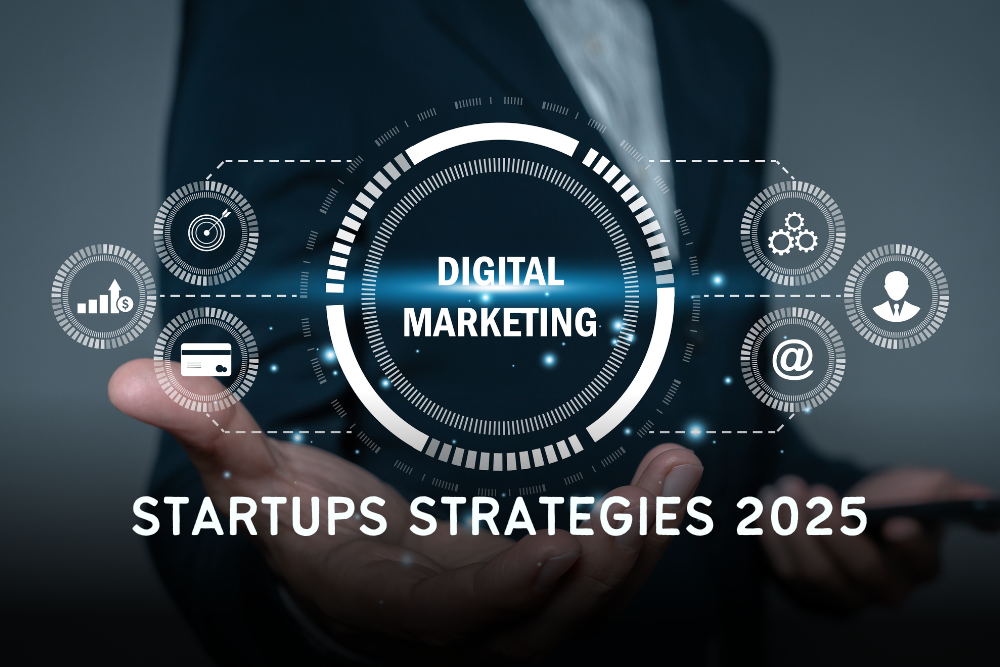Digital marketing continues to evolve at a rapid pace, with new technologies, platforms, and strategies constantly reshaping the landscape. As we move into 2025, businesses need to be more agile than ever to stay competitive in the digital world. The days when digital marketing consisted primarily of creating a website, running a few social media ads, and sending occasional email newsletters are long gone. Today, successful digital marketing requires a sophisticated understanding of various tools, techniques, and trends that span the digital ecosystem.
In this article, we will explore the strategies and trends that will define digital marketing in 2025, helping businesses, marketers, and entrepreneurs adapt to the fast-changing digital environment. From AI-driven marketing automation to the importance of personalized content, mastering digital marketing in 2025 requires a comprehensive approach that integrates technology, creativity, and consumer behavior insights.
1. The Rise of Artificial Intelligence (AI) and Automation
One of the most transformative trends in digital marketing is the rise of Artificial Intelligence (AI) and automation. As we approach 2025, businesses will increasingly rely on AI to enhance their digital marketing efforts. AI can analyze vast amounts of data, predict consumer behavior, and automate processes that were once time-consuming and manual.
a. AI-Driven Content Creation
Content marketing has always been at the heart of digital marketing strategies, but with AI advancements, the way content is created and personalized is undergoing a profound change. Tools like GPT-4 and other AI-driven content generators enable marketers to create personalized content at scale. By analyzing consumer data, AI can help create content that resonates with specific audience segments, enhancing engagement and conversion rates.
For example, AI tools can generate blog posts, social media updates, email subject lines, and even product descriptions, all tailored to the preferences and interests of individual users. This allows businesses to maintain a steady flow of high-quality content without the need for extensive human intervention.
b. Marketing Automation
AI-driven marketing automation will be an essential tool for digital marketers in 2025. Marketing automation platforms allow businesses to streamline their campaigns, sending targeted messages to the right people at the right time. From email marketing campaigns to social media scheduling, AI tools will help automate the entire customer journey, ensuring that every touchpoint is personalized and relevant.
For instance, platforms like HubSpot, Marketo, and Salesforce offer robust marketing automation tools that allow businesses to nurture leads, segment audiences, and track the effectiveness of campaigns in real time. By using AI to automate repetitive tasks, marketers can focus more on strategy and creative efforts.
2. Personalization: The Key to Connecting with Customers
Personalization has been a growing trend in digital marketing for the past few years, but in 2025, it will become even more crucial. Consumers expect brands to provide relevant, personalized experiences across all channels. Whether it’s through targeted email campaigns, personalized website experiences, or product recommendations, personalization is key to building deeper relationships with customers.
a. Data-Driven Personalization
With the help of big data analytics and AI, businesses can create highly personalized marketing campaigns that are tailored to the specific needs and behaviors of their audience. By analyzing customer data, businesses can create buyer personas that help them understand the motivations, preferences, and pain points of their target audience.
For example, if a consumer has previously visited a website and added an item to their cart but didn’t complete the purchase, businesses can send personalized retargeting ads or email reminders. These tailored communications are much more likely to drive conversions than generic, one-size-fits-all messages.
b. Hyper-Personalized Customer Journeys
In 2025, the expectation for hyper-personalized customer journeys will be the norm. Businesses will need to create tailored experiences that guide customers seamlessly from one stage of the buying process to the next. This involves leveraging AI and data analytics to deliver content, offers, and messages that speak directly to individual customers’ needs and desires.
For instance, a clothing retailer might use data from a customer’s previous purchases and browsing history to recommend specific items or even offer personalized discounts. This type of personalization helps to foster loyalty and increase the lifetime value of customers.
3. Voice Search Optimization and Conversational AI
As the popularity of voice-activated devices like smart speakers continues to rise, voice search optimization is becoming increasingly important for businesses. By 2025, it’s expected that voice search will account for over 50% of all online searches. As such, businesses must optimize their websites and content for voice search if they want to stay relevant.
a. Voice Search SEO
Voice search queries are typically longer and more conversational than traditional text searches. For example, while a person may type “best running shoes for men” into Google, they may ask their voice assistant, “What are the best running shoes for men in 2025?” Optimizing for voice search involves focusing on long-tail keywords, natural language, and answering specific questions in a conversational tone.
To succeed in voice search SEO, businesses must adapt their content strategy by incorporating more FAQ sections, structured data, and conversational keywords. Ensuring your website is mobile-friendly and loads quickly is also crucial, as voice searches are often performed on mobile devices.
b. Conversational AI
Conversational AI, including chatbots and virtual assistants, is set to become a key part of customer service and marketing in 2025. With the help of AI, businesses can engage with customers in real time, answering questions, providing support, and even assisting with product recommendations.
For example, many e-commerce websites already use chatbots to guide customers through the buying process, suggest products, and handle customer service inquiries. As AI technology improves, conversational AI will become even more sophisticated, offering highly personalized, human-like interactions.
4. Video Marketing: The Dominant Format for Engagement
Video continues to be one of the most engaging and effective forms of content in digital marketing. As internet speeds improve and platforms like YouTube, TikTok, and Instagram dominate, video marketing will only continue to grow in importance by 2025.
a. Short-Form Video Content
Short-form video content, popularized by platforms like TikTok and Instagram Reels, will become even more crucial for marketers. These bite-sized videos capture the attention of viewers quickly and are perfect for sharing on social media. In 2025, businesses will need to create engaging, concise, and shareable videos that fit within these formats.
Short-form videos are great for showcasing products, sharing brand stories, offering tutorials, and even promoting user-generated content. The key to success with short-form videos is to create content that resonates with your audience, is visually appealing, and encourages interaction.
b. Live Streaming
Live streaming is another video format that will continue to grow in importance by 2025. Platforms like Facebook Live, Instagram Live, and YouTube Live offer businesses the opportunity to connect with audiences in real-time. Whether it’s hosting a product launch event, a Q&A session, or behind-the-scenes content, live streaming fosters a sense of urgency and excitement.
Consumers are more likely to engage with live content, as it allows for immediate interaction and participation. By 2025, live streaming will be an essential part of any comprehensive digital marketing strategy.
5. The Role of Social Media in Digital Marketing
Social media will remain an integral part of digital marketing in 2025. Platforms like Facebook, Instagram, TikTok, Twitter, and LinkedIn are critical for reaching a wide audience, building brand awareness, and driving sales.
a. Social Commerce
Social commerce, or the ability to sell directly through social media platforms, will be a major trend in 2025. With features like Instagram’s “Shop” tab and Facebook Marketplace, businesses can set up online stores directly within social media apps. This provides a seamless shopping experience for users, allowing them to make purchases without leaving the platform.
b. Influencer Marketing
Influencer marketing will continue to thrive in 2025, particularly on platforms like Instagram and TikTok. Influencers have become an essential part of digital marketing strategies, as they allow brands to connect with highly engaged audiences in an authentic way. As influencer marketing matures, businesses will need to focus on working with influencers who align with their values and target audience.
FAQs
1. What is the most important digital marketing strategy for 2025?
In 2025, AI-driven automation, personalization, and video marketing will be the most critical strategies for success. Personalization and the ability to deliver tailored experiences will be crucial for engagement and conversion.
2. How can AI help with digital marketing?
AI can help automate tasks, analyze vast amounts of data, and personalize marketing efforts. AI tools can improve content creation, email marketing, social media campaigns, and customer segmentation.
3. What is voice search, and how should I optimize for it?
Voice search is the use of voice assistants (like Siri, Alexa, and Google Assistant) to perform online searches. To optimize for voice search, focus on long-tail keywords and conversational language, and ensure your website is mobile-friendly.
4. Why is video marketing important in 2025?
Video marketing is essential for engagement. Short-form videos, live streaming, and visual content help capture attention quickly and foster a connection with your audience.
5. What is social commerce?
Social commerce is the ability to sell products directly through social media platforms like Instagram and Facebook. It allows businesses to create a seamless shopping experience within social media apps.
6. How do I create personalized marketing campaigns?
To create personalized marketing campaigns, leverage data analytics and AI to understand your audience’s preferences and behaviors. Segment your audience and tailor your messaging to meet their specific needs.
7. What are some future trends in digital marketing?
Key trends include AI-driven automation, voice search optimization, video content growth, and the increasing importance of social media and influencer marketing.
Conclusion
Digital marketing in 2025 is poised to be more dynamic, personalized, and technology-driven than ever before. Businesses must adapt to emerging trends such as AI automation, voice search, and video marketing to stay competitive. Personalization will be at the core of successful marketing strategies, as consumers expect tailored, relevant experiences.
As the digital marketing landscape continues to evolve, businesses that embrace these trends and leverage cutting-edge tools and techniques will have a significant advantage in engaging their audience and driving conversions.
Key Takeaways:
- AI and automation will play a crucial role in personalizing marketing efforts and improving efficiency.
- Personalization, powered by data analytics and AI, is essential for creating meaningful customer experiences.
- Video marketing, especially short-form and live streaming, will dominate the digital marketing landscape in 2025.
- Social commerce and influencer marketing will continue to grow as vital components of successful digital marketing strategies.

